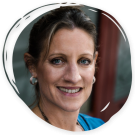“we always try to do everything, but we must let go, and look at how we occupy the present moment”
Steve and I delve into his model of different depths of practice and the idea of unfoldment to learn to navigate complexity more effectively. Taking a more holistic and integrated ecology of coaching practice to open up channels of wisdom and looking at the different ways human beings have learnt to grow, individually and collectively.
As we move into a more connected and digital world we see ourselves as humans in “technological terms”, to be ‘upgraded’ or ‘fixed’ through self improvement. This however is often at the cost of our humanity. How can we shift from this to a different and more human centred paradigm. What if we didn’t need to be ‘fixed’ but rather to ‘let go’ and let ourselves ‘unfold’ ?
Improvement is often driven by assessment, evoking resistance and anxiety, and triggering emotions and defences as we are asked to fit in rather than belong; self-unfoldment helps us navigate complexity.
Steve shares his experience, methodology and insights from working with clients and organisations across the globe.
The main insights you’ll get from this episode are :
- A holistic coaching method to face unprecedented challenges, particularly post-Covid – an integrated ecology of coaching practice, next-generation coaching, and a variety of methodologies and philosophies to make it more accessible.
- Powerful coaching is like a great work of art – it reveals the profound wonder of being human, very important in a digital world – the Aletheia method is based on unfoldment and a curiosity to learn more.
- Attunement – of which there are two types, technical and poetic – is the key to shifting between self-improvement and self-unfoldment. Self-improvement prevails in our global culture: we want to feel competent but often start from a feeling of deficiency. Self-unfoldment is based on the premise that nothing is missing, we just need to find it.
- The philosopher Martin Heidegger saw how the view of technology was overtaking the view of being human – we see ourselves as humans in technological terms, to be ‘upgraded’ or ‘fixed’, but at the cost of our humanity.
- He suggested attuning to the world more poetically: what do we feel, in our body, in our life? This allows deeper self-discovery but is a huge shift, particularly in organisations as everything is based on performance.
- Improvement is often driven by assessment, evoking resistance and anxiety, and triggering emotions and defences as we are asked to fit in rather than belong; self-unfoldment helps us navigate complexity.
- We all operate at different depths. If we can find a way of moving fluidly between different depths, we can change the conversation and see powerful results. There are four depths:
1. Depth of parts: everything is seen as separate, outwardly and inwardly; a partial view. The Aletheia method is about parts work: make the parts feel seen and understood, loved and valued as they are. This naturally leads to the next level of ….
2. Depth of process: experiencing the fluid flow of felt experience; a more embodied depth; feeling relatedness. Relational intelligence is necessary for high performing leaders to be present with people (a felt sense of what’s happening between people).
3. Depth of presence: a sense of wholeness; I am equal to what is happening in life; I can meet this moment as it is; I can navigate through it; I have the human virtues required, e.g. love, perseverance, compassion, inner strength, humility, patience.
4. Depth of non-duality: non-separation; a sense of shared humanity in a spiritually profound way; if we relax our defences, we land more in relationship with each other – we often live on the surface of life.
- How does depth change inclusion? Group unfoldment is intricately linked to group leadership – we must create the conditions to allow natural unfoldment. We don’t always need to go deep as the surface can provide helpful insights.
- The poetry of humanness in terms of D&I is understanding differences, prejudices, triggers, and powerful conversations to have impactful results. Inclusion is about where we are the same and where we are different, all based on compassion.
- Psychological safety is essential; it is too easy for people to feel misunderstood and not valued for who they are. This reflects the relationship most of us have with ourselves, always under pressure to be a better version of who we are.
- All parts have a positive intention: we must try and understand how we try to help, protect ourselves/the organisation but behaviour often doesn’t fulfil or even sabotages the intention- we must acknowledge the good intention.
- We try to do everything but must let go – micro-practices move the momentum in a different direction, away from overwhelm. We must look at how we occupy the present moment(s) throughout the day, to which we can always return.
- Things we seek, e.g. more fulfilling relationships, relaxation, are available to us right now if we can look to poetic attunement.
- We should aim for self-acceptance – ironically the most powerful way to transform ourselves – as a first step towards self-compassion.
Find out more about Steve’s work here : https://integralunfoldment.com/









